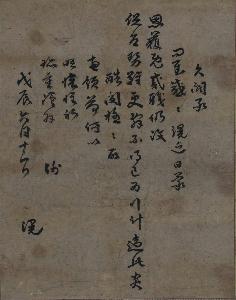Yi Hwang
Yi Hwang;Toegye
Place: Andong
Born: 1501
Death: 1570
Biography:
Yi Hwang, also known as Toegye, was a prominent Korean philosopher, writer, and Confucian scholar of the Joseon period. He is considered one of the most important philosophers in Korea and is honored by printing his portrait on the 1000 Won banknote. Yi Hwang was born in 1501 and passed away in 1570.
Early Life and Education
Yi Hwang's early life and education are not well-documented, but it is known that he came from a family of scholars and officials. He studied Confucianism and Neo-Confucianism, which had a significant influence on his philosophical thoughts and writings. Yi Hwang was also an accomplished painter, and his artwork is characterized by its simplicity, harmony, and realism. Yi Hwang's paintings are highly regarded for their beauty and elegance. Some of his notable works include Toegye's Album, which showcases his skill as a painter and his ability to capture the essence of Korean culture. His artwork can be found in various museums, including the National Museum of Korea and the Korean Art Museum Association.
Philosophical Contributions
Yi Hwang's philosophical contributions are significant, and his writings have had a lasting impact on Korean thought. He was a key figure in the development of Neo-Confucianism in Korea and played a crucial role in establishing the Yeongnam School. Yi Hwang's philosophical ideas were influenced by Zhu Xi, a Chinese philosopher who emphasized the importance of personal and governmental morality. Some of Yi Hwang's notable writings include Ten Diagrams on Sage Learning, which has been translated into several languages, including modern Korean, Japanese, Vietnamese, English, French, German, Russian, and Polish. His main work is a testament to his intellectual prowess and his ability to communicate complex ideas in a clear and concise manner.
Legacy
Yi Hwang's legacy extends beyond his philosophical contributions. He was also a talented painter, and his artwork continues to be admired by art lovers around the world. Kim Hong-do, another renowned Korean painter, was influenced by Yi Hwang's style and technique. Key aspects of Yi Hwang's legacy include:
- His contributions to Neo-Confucianism in Korea
- His establishment of the Yeongnam School
- His writings, including Ten Diagrams on Sage Learning
- His artwork, which showcases his skill as a painter and his ability to capture the essence of Korean culture
In conclusion, Yi Hwang was a prominent figure in Korean philosophy and art. His contributions to Neo-Confucianism and his establishment of the Yeongnam School have had a lasting impact on Korean thought. His artwork continues to be admired by art lovers around the world, and his legacy serves as an inspiration to artists and philosophers alike. Yi Hwang's story is a testament to the power of human creativity and the importance of preserving our cultural heritage.


